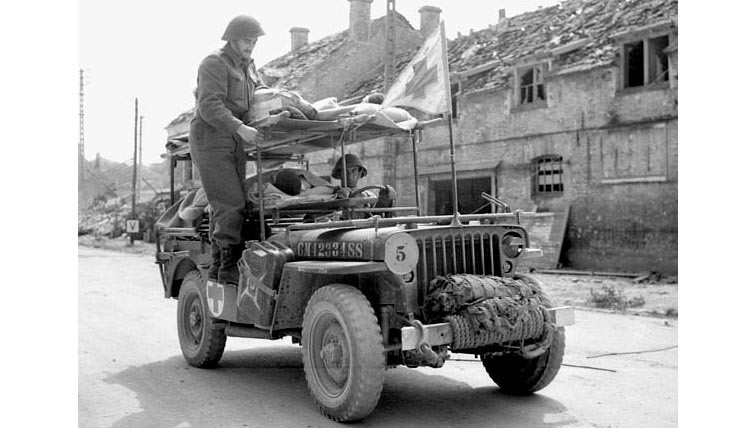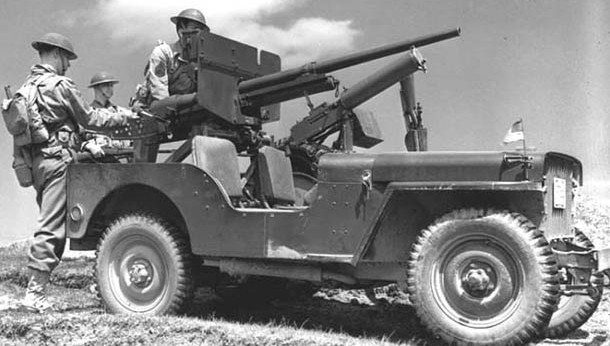
Jeeps were the workhorses of World War II. In these two photos, it is obvious how they were employed in various tasks to win the war.
By: Phil Kohn. Dedicated to the memory of his father, GM3 Walter Kohn, U.S. Navy Armed Guard, USNR, and all men and women who have answered the country’s call in time of need. Phil can be contacted at ww2remembered@yahoo.com.
On August 1, 1941, Willys-Overland Motors of Toledo, Ohio, rolls the first production model of its MB four-wheel-drive utility vehicle — known as “the jeep” — off its assembly line for the U.S. Army. Some 640,000 of the vehicles follow, through 1945. In a decision aimed specifically at Japan, President Roosevelt forbids the export of oil and aviation fuel from the United States to anywhere except Great Britain, British Commonwealth countries and nations of the Western Hemisphere. Roosevelt’s dictum expands on the freezing of Japanese assets in the U.S., (which occurred on July 26th). As a consequence of the American restrictions on petroleum exports, Japan is left with only limited stocks of oil for its extensive navy and for its domestic consumption. The predicament is such that the Japanese government must weigh either changing its foreign policy of expansion very radically or deciding to go to war and try to secure access to oil in the East Indies.
German forces in the north of Russia on August 2 begin to attack Staraya Russa, 62 miles south of Novgorod on their drive toward Leningrad. The United States begins sending Lend-Lease aid to the Soviet Union. Great Britain calls upon the governments of Iran and Afghanistan to expel all Germans immediately. In Occupied Norway, German occupation authorities confiscate all civilian radios.
Another German encircling movement closes on August 3 near Pervomaysk on the Bug River in southern Ukraine, trapping numerous units of the Red Army. In Münster, Germany, Catholic Bishop Clemens Graf von Galen gives a sermon making public and condemning the Nazi secret program of forcibly euthanizing institutionalized medical and psychiatric patients deemed “incurably sick.”
On August 4 a small air raid by planes from the British carrier HMS Victorious is launched against German installations in Tromsø, in far northern Norway. Japan halts all commercial steamship traffic with the United States. Hitler meets with the top commanders of German troops in Russia: Field Marshal Fedor von Bock and Generals Heinz Guderian and Hermann Hoth. The three soldiers agree that a drive on Moscow should be the main priority, so as to get there before the harsh Russian winter sets in. Hitler, however, favors other goals, such as eliminating pockets of enemy resistance, and orders this be done first.
On the Eastern Front, the provisional Government of Lithuania is dissolved, on August 5. The fighting around Smolensk (220 miles west-southwest of Moscow) comes to an end: The Germans claim to have taken 310,000 prisoners and to have killed many of the 700,000-strong Soviet force; the Soviets admit to far lower losses. In Vichy France. Admiral François Darlan is placed in charge of government policy in North Africa, with Maxime Weygand, a World War I French Army staff officer, as his deputy.
In Tokyo on August 6 the Japanese government — headed by Prime Minister Prince Fumimaro Konoe — presents proposals to the U.S. involving some concessions in China and Indochina, asking in return for the end of the freeze on Japanese assets. The U.S. finds the proposals unacceptable because Japan will not back off its expansionist policies. When the rejection is made known to the Japanese, they propose that Konoe and Roosevelt meet to discuss the issues at stake. On the same day, both the U.S. and the U.K. warn Japan that any act threatening the independence and integrity of Thailand would be “a matter of concern.”
On August 7, the British submarine HMS Severn sinks an Italian Marconi-class submarine off the northwest coast of Africa. A small force of Soviet bombers raids Berlin; the German capital is bombed on six more occasions by the Soviets this month. In Washington, the Senate, after considerable debate, passes an extension of the period of service for draftees from one year to thirty months (and a similar increase for service in the National Guard). President Roosevelt arrives in Placentia Bay, Newfoundland, Canada, aboard the heavy cruiser USS Augusta. Ostensibly on vacation, Roosevelt is there to meet with British prime minister Churchill. On the other side of the world, Australia’s government states that it “will not stand by and watch” Japanese expansion in the Pacific.








